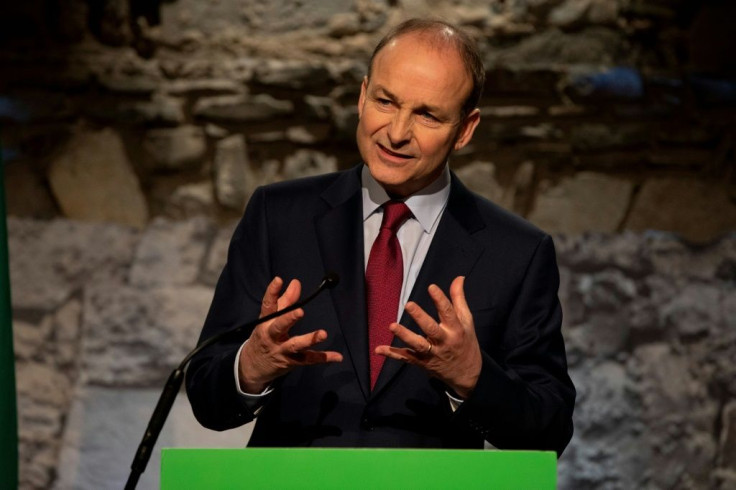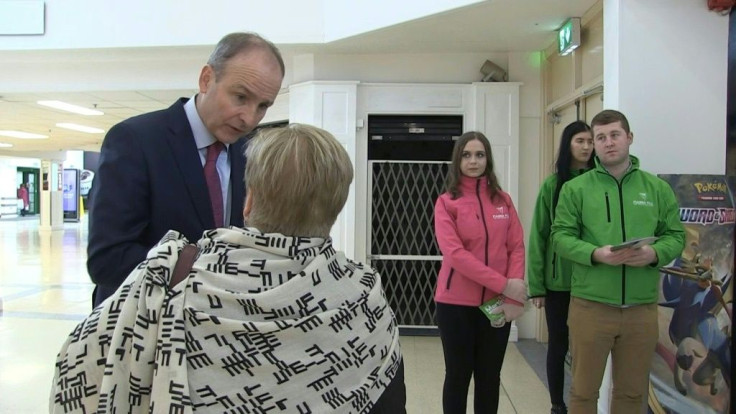Micheal Martin: Boxer's Son Sparring To Be Ireland's Next PM

Micheal Martin hopes his nine-year effort to rehabilitate Fianna Fail after Ireland's ruinous recession will be enough to return the party to government after Saturday's elections and make him prime minister.
His centre-right party tumbled from power in 2011, punished by voters for leading the republic into the post-"Celtic tiger" slump.
But with a new economic boom, memories of the recession are fading and the former foreign minister hopes his marathon push to restore Fianna Fail's reputation will pay dividends.
"We are running 84 candidates," Martin told AFP on Friday on his final day out campaigning in his Cork constituency.
"The only party who can lead an alternative government is Fianna Fail, with other parties, such as the Greens and Labour, and other centre ground politicians."
Martin hails from Cork, Ireland's second city on the southeast coast. Born on August 1, 1960, his father was a former prisoner of war, Irish international boxer and bus driver.
Martin attributes his resilience to his father, who would wake his son late at night to watch fights between Muhammad Ali, Joe Frazier and George Frazier, talking him through every punch.
Weekend boxing practice, avoiding punches, jabbing and scoring points, was perfect preparation for his future life, he told the Sunday Independent newspaper.
"There are similarities in terms of how you would dance around the political ring," he said.
After graduating from University College Cork, he briefly worked as a teacher and was first elected to Ireland's Dail Eireann lower house of parliament in 1989.
During Fianna Fail's run in power from 1997 to 2011, he served variously as minister for education, health, and enterprise, before taking the foreign affairs brief.
His landmark achievement was the smoking ban of 2004, which made Ireland the world's first nation to impose a blanket ban on workplace smoking.
A father of five, the years were also touched by tragedy when Martin's seven-year-old daughter Leana died from a heart condition in 2010. She was the second of his children to pass away.
In May 2008, Martin became the minister for foreign affairs under then-prime minister Brian Cowen.

Within weeks, he oversaw the agreement of a landmark international convention banning cluster munitions, after 12 days of talks in Dublin.
He was charged with the campaign to convince the public to back the Lisbon Treaty on EU reform ahead of a referendum in 2008.
It was rejected by 53 percent of the public. The Irish Independent newspaper called it the "biggest political crisis in decades".
The referendum was re-held and passed with 67 percent of the vote the following year.
But it was a bellwether for the public's resentment of the government as the country plunged into recession.
The "Celtic Tiger" boom years from the mid-1990s to the mid-2000s saw Ireland economically transformed from one of Europe's poorest countries.
But when the global financial crisis took hold in 2008, the Irish property bubble burst, toppling much of the economy with it as badly-exposed banks began to falter.
In 2010, Cowen was forced to seek a hefty international bailout and impose harsh austerity measures as Ireland entered a new period of emigration and unemployment.
Cowen's leadership imploded in January 2011, with heavyweight Martin quitting the government. The crisis triggered an early general election in February.
Martin took over the party leadership, but the Fine Gael opposition, led by Enda Kenny, routed them at the polls.
Fianna Fail took only 20 out of 166 Dail seats -- the worst defeat of a sitting government in the state's history.
In the 2016 election, Fianna Fail more than doubled its number of deputies and became kingmakers, striking a confidence and supply agreement with old rivals Fine Gael.
Polls suggest Fianna Fail's punches are landing as they vie for a knock-out in Saturday's election.
© Copyright AFP 2024. All rights reserved.




















